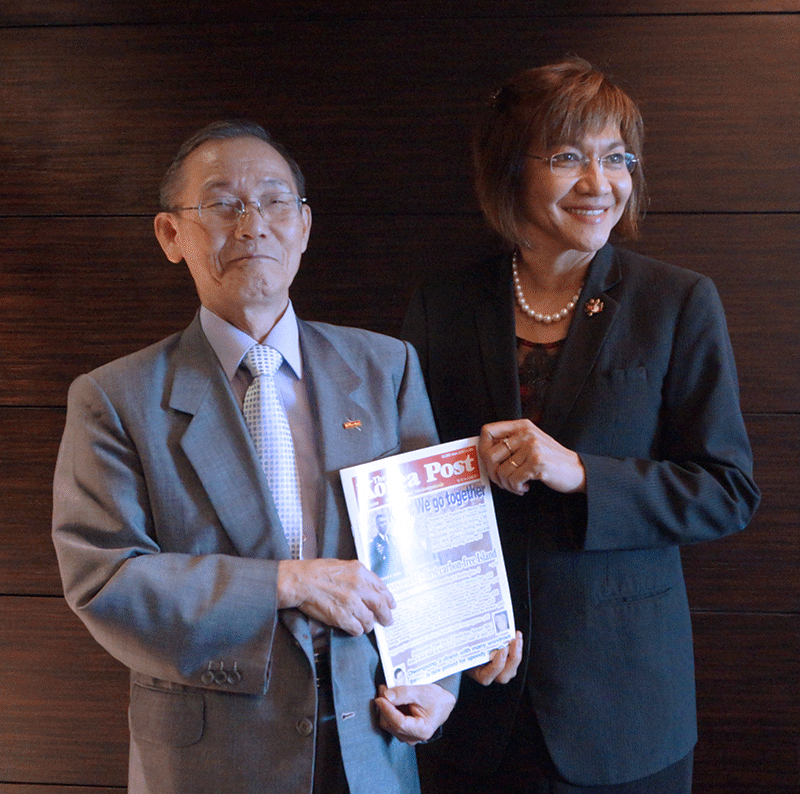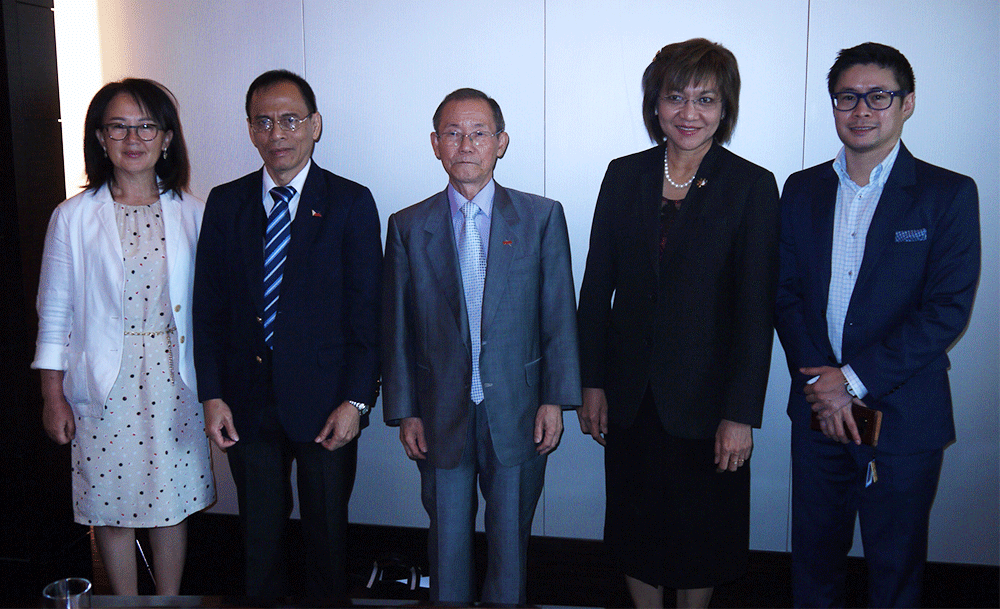Interview with Undersecretary Nora K. Terrado of the Philippines
“The Philippines warmly welcome Korean investors and businessmen. We have valuable propositions and our country is a good location for global chain production line,” said Undersecretary Nora K. Terrado of the Republic of Philippines at an exclusive interview with The Korea Post media at the Seoul Plaza Hotel on July 21, 2017.
Following the deployment of Terminal High Altitude Area Defense system of the United States in Korea, pressures from China continue to grow on the defenseless Korean business companies in China, such as Lotte, and many of the Korean companies are looking for alternative countries as it happened to the US and Japanese companies a few years earlier.

Against this backdrop, The Korea Post media selected a number of countries to see what they could offer to the Korean companies wanting to come out of the difficult region to continue business as many of them enjoy a very good reputation in their host countries for good deeds such as participation in charity activities for the needy as well as contribution to the economic development of the host country.
Details of the interview follow:
Question: What specifically are the areas in your country where increased economic cooperation with Korea is desired most?
Answer: The Philippines is happy to welcome more Korean investors and businesses. We have many mutually advantageous propositions and we believe that our country is a good location for inclusion in the global value chain of Korean manufacturing companies. We offer good value for money — lower cost of labor and a dynamic business environment. Manufacturing is definitely one of the most appealing sectors for Korean businesses. Our priorities would be in the area of electronics, automotive manufacturing — traditional as well as new technologies like e-vehicle production, shipbuilding and food processing. Apart from the import and export of goods, we would like to emphasize the growing tourism and service sectors as well as the wealth of opportunities in agribusiness. We are also inviting Korean banks to establish a presence in the Philippines. Moreover, the Philippines has entered the golden age of infrastructure as we recognize its importance in our industrial development. At the moment, infrastructure development numbers is at 3% of GDP and we have a target to increase this number by 5 to 7%.

Q: You might be aware of the role of the decoy ducks. In a good sense and for good purpose of increasing business cooperation between Korea and your country, who are the Korean companies doing good business in your country?
A: There are three categories of Korean companies represented in the Philippines. The first category is for the companies that take advantage of an active and very robust consumption economy that allows them to achieve brisk sales in the Philippines. The population of the Philippines is 100 million people. We import a lot of vehicles from Korea categorized between 1,500 CC to 3,000 CC. Certainly, big companies, such as Hyundai are present in our country. Major Korean cosmetics brands have already penetrated the market. Korean Shinhan Bank and Woori Bank have offices in the Philippines. POSCO E&C is currently developing The Sharp luxury residential real estate projects in Clark City. Of course, Samsung, which is represented all over the world. We also have CJ Home Shopping. The second category is for the companies that are not here for the domestic market, but rather for our resources and labor. They produce goods in the Philippines and then export them abroad. One major example would be Hanjin Shipbuilding. Hanjin is huger not only in terms of logistics, but also in human resources as it employs the largest domestic labor force compared to other Korean companies within the Asia-Pacific region. Their plant, located at a former U.S. Navy base, employs around 100,000 Filipino

workers. Another example is the SFA Semicon located in a former U.S. Air Force base that manufactures electronics and integrated circuits located. The third category is for companies that are here to profit from the country’s continuing GDP growth and maximize opportunities in infrastructure development. Last year, our GDP grew faster compared to other countries in Asia. Korea is very strong in construction. Big construction companies like Samsung E&C have subsidiaries in the Philippines. Korean presence in the energy sector is growing as well; companies like KEPCO already have projects in our country. Korea is also into renewable energy and we 7 solar panel projects with high participation – up to 40% — from the Korean side. There are also a number of joint water supply projects. Lastly, small and medium-sized enterprises (SMEs) are widely represented in garment and food production. The Korean-Philippine Chamber of Commerce actively promotes SME cooperation.
Q: What incentives, if any, does your country offer to the Korean companies who want to newly enter your country for business and/or business cooperation with the companies of your country?
A: We have a major law – Executive Order No. 226 stipulating incentives in general sectors of the economy. The basic incentive is the income tax holiday (ITH) — for 4 to 8 years, special tax rate of 5% on gross income for locators in the Philippine Economic Zone Authority (PEZA), duty-free importations of capital equipment and raw materials used for exports.
There are benefits/incentives provided for renewable energy developers under Republic Act 9513 or the Renewable Energy (RE) Act of 2008. As part of the incentives, RE developers are provided with 7 years of income tax holiday (ITH) for power generating plants. After this, the company will have to pay only a 10% corporate income tax compared to 30% for other fields. Another incentive for RE developers is the Feed-in-Tariff (FIT)* rate which is a fixed tariff over a period of time (20 years from the date of commercial operation).
With do provide generous incentives for investors. There are a lot of investment promotion agencies as well that Korean investors could tap to know more of these benefits. We have the Subic Bay Metropolitan Authority, Clark Development Corporation, Bases Conversion and Development Authority, Mindanao Development Authority, Authority of the Freeport of Bataan, Board of Investments, and Zamboanga City Special Economic Zone Authority.
Q: Who is the minister of commerce, industry or economic cooperation with foreign countries? Please elaborate. Please provide us with a good picture of the minister for publication.
A: Mr. Ramon M. Lopez is the Secretary of the Philippines’ Department of Trade and Industry (DTI). Prior to his appointment as the Secretary of DTI, he was part of the private sector. He graduated from the University of the Philippines with a major in Economics and got his Master’s Degree with distinction at William College in Massachusetts.
Mr. Lopez started his career at the Department of Trade and Industry and throughout his career he has been advocating the development and promotion of micro, small and medium-sized companies. Later he moved to National Economic and Development Authority (NEDA).
When he joined the private sector, he became a top business executive and worked as a strategist and marketing executive in a large Philippine conglomerate. He eventually earned the reputation as an industrial leader and staunch champion of entrepreneurship. Mr. Lopez was the Executive Director of the advocacy group called “Go Negosyo” for 11 years advocating entrepreneurship even among the women, disabled, and seniors.
Q: What type of Korean companies are desired to enter your country for mutually profitable business cooperation? Do you have any specific Korean companies in mind?
A: There are ongoing negotiations with large companies but due to their confidential nature we are not at liberty to disclose their names at this stage. These companies will make their formal announcements as soon as they open their offices or launch their projects in the Philippines.
Q: Businessmen want rest, recuperation and recreation in return for their hard work. What are the tourist, amusement and recuperation destinations in your country? Please elaborate, as the Korean businessmen really want to use them.
A: The Philippines is an ideal destination for Korean executives as we offer affordable luxury. We have a large inventory of comfortable hotels and resorts with a complete array of amenities from which visitors can sortie and experience our exquisite beaches, cool mountains, and an interesting assortment of cultural and natural attractions under the warmth of our tropical sun.
We offer not only recreational tourism, but educational tourism as well. Medical tourism is also a growing sector. We have adopted international standards when it comes to business centers, hospitals, training and convention facilities and the like. However, even more satisfying than our excellent facilities, the Philippines provides our world renowned hospitality that translates into great customer service from our ever smiling people and results in a delightful and memorable experience for our visitors.
Korea is one of the top source countries of tourists to the Philippines. We welcome some 1.4 million Korean tourists annually who come for both business and pleasure. Interestingly, we have a growing number of Korean investors who have tourist facilities in the Philippines. We have found that Korean tourists usually prefer to stay at a hotel run by Koreans with Korean menus. Thus, many Koreans have embarked on joint ventures in Philippine resorts, residential and commercial facilities, and golf courses.
We also promote the development of retirement villages. You may tap our government office that is responsible for this.
Q: Please introduce yourself to the Korean business world together with your family and hobbies.
A: My name is Nora Terrado and I am the Undersecretary responsible for the trade and investment promotion of the Philippines in the international and domestic markets. I am also a Governor at the Philippine Board of Investments.
Prior to my work in the government which began four years ago, I was the President of a global software services company called Headstrong. We had around 600 software engineers and we were building and maintaining software for large U.S. companies focused on capital markets, i.e. fixed income equities, derivatives, options and stocks.
I was one of the pioneers in the IT offshoring and outsourcing service industry in the country. I served as the President of the Philippine Software Industry Association and as a Trustee of the IT Business Process Association of the Philippines (IBPAP).
I was also active with the Joint Chambers of Commerce. I was a Finance Executive, a certified public accountant who rose to the post of Chief-Financial-Officer (CFO) and eventually became a Chief-Executive-Officer(CEO), particularly focused in Information Technology (IT).
I was one of the pioneers of the company that I joined. It began as a start-up and eventually grew large enough to be acquired by a major global company. This was why I ended up retiring from the private sector and joining the public service.
I have a Bachelor’s Degree in Commerce and an associate Degree in Liberal Arts. I studied strategic economics in the Philippines where the emphasis is on practical economics.
My principal advocacy is focused on helping women become business leaders. In my spare time, I mentor young women who aspire to be business executives or entrepreneurs, especially in the field of technology. Right now, I am mentoring three young women. One is specialized in IT and two others in biotechnology and commerce.

